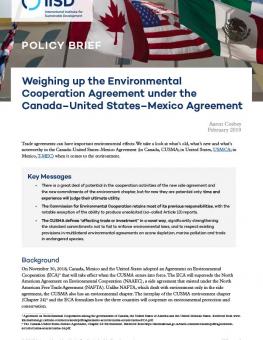
Weighing up the Environmental Cooperation Agreement under the Canada-United States-Mexico Agreement
Trade agreements can have important environmental effects. We take a look at what’s old, what’s new and what’s
noteworthy in the Canada–United States–Mexico Agreement when it comes to the environment.
Key Messages
- There is a great deal of potential in the cooperation activities of the new side agreement and the new commitments of the environment chapter of the Canada–United States–Mexico Agreement (CUSMA), but for now they are potential only: time and experience will judge their ultimate utility.
- The Commission for Environmental Cooperation retains most of its previous responsibilities, with the notable exception of the ability to produce unsolicited (so-called Article 13) reports.
- The CUSMA defines “affecting trade or investment” in a novel way, significantly strengthening the standard commitments not to fail to enforce environmental laws, and to respect existing provisions in multilateral environmental agreements on ozone depletion, marine pollution and trade in endangered species.
On November 30, 2018, Canada, Mexico and the United States adopted an Agreement on Environmental Cooperation (ECA) that will take effect when the Canada–United States–Mexico Agreement (CUSMA) enters into force. The ECA will supersede the North American Agreement on Environmental Cooperation (NAAEC), a side agreement that existed under the North American Free Trade Agreement (NAFTA). Unlike NAFTA, which dealt with the environment only in the side agreement, the CUSMA also has an environmental chapter. The interplay of the CUSMA environment chapter (Chapter 24) and the ECA formalizes how the three countries will cooperate on environmental protection and conservation.
Trade agreements can have important environmental effects. We take a look at what’s old, what’s new and what’s noteworthy in the CUSMA when it comes to the environment.
Participating experts
You might also be interested in
Global Dialogue on Border Carbon Adjustments
This report contributes to the global BCA discussion by summarizing country-level reports reflecting dialogues conducted in Brazil, Canada, Trinidad and Tobago, the United Kingdom, and Vietnam.
Why Liquefied Natural Gas Expansion in Canada Is Not Worth the Risk
An analysis of the economic and environmental risks of liquified natural gas expansion in Canada.
What to Expect at Plastics INC-5
Q and A with Tallash Kantai of Earth Negotiations Bulletin on INC-5.
What Drives Investment Policy-makers in Developing Countries to Use Tax Incentives?
The article explores the reasons behind the use of tax incentives in developing countries to attract investment, examining the pressures, challenges, and alternative strategies that exist.